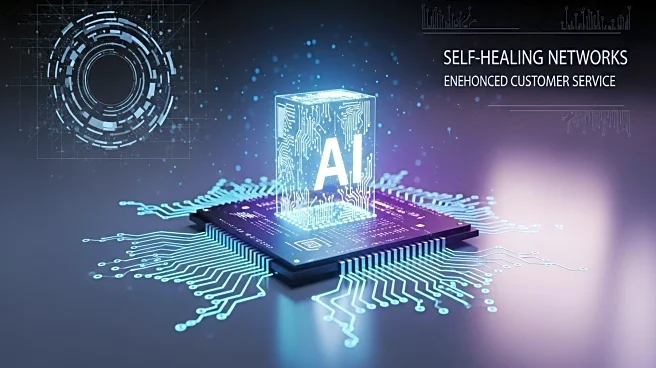What's Happening?
Telecom Secretary Neeraj Mittal has emphasized the transformative potential of Artificial Intelligence (AI) in the telecommunications sector, particularly in making networks self-healing and enhancing customer service. Speaking at the India Mobile Congress 2025, Mittal outlined the government's efforts to keep pace with technological advancements and collaborate with the International Telecommunication Union to harmonize AI developments in telecom. He noted that AI could significantly improve network intelligence as the industry transitions from 5G to 6G, with trials expected to begin in 2028. However, Mittal also warned of the risks associated with AI, such as deepfakes, voice cloning, and financial fraud, which necessitate constant vigilance.
Why It's Important?
The integration of AI into telecom networks is poised to revolutionize the industry by enhancing operational efficiency and customer service. This development is crucial as it aligns with the global shift towards more intelligent and autonomous network systems, potentially reducing downtime and improving user experience. However, the risks associated with AI, including its potential misuse for fraud and identity theft, highlight the need for robust security measures. The telecom sector, therefore, stands at a crossroads where it must balance innovation with security to protect consumers and maintain trust.
What's Next?
As the telecom industry prepares for 6G trials in 2028, stakeholders will likely focus on developing AI-driven solutions that enhance network resilience and customer service. The government and industry players may also prioritize creating frameworks to mitigate AI-related risks, ensuring safe and secure deployment. Additionally, ongoing collaboration with international bodies like the ITU will be essential to harmonize standards and practices globally, fostering a secure and inclusive AI ecosystem.
Beyond the Headlines
The ethical implications of AI in telecom, particularly concerning privacy and security, are significant. As AI tools become more prevalent, the industry must address concerns about data protection and the potential for surveillance. Furthermore, the shift towards AI-driven networks may lead to changes in workforce dynamics, requiring new skills and roles to manage advanced technologies. These developments underscore the need for comprehensive governance and standards to ensure AI's responsible use.










